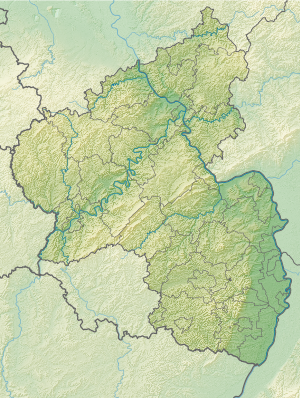Nürburg (castle)
| Nürburg | ||
|---|---|---|
|
Aerial view of the Nürburg (2014) |
||
| Alternative name (s): | Noureberg, Mons Nore | |
| Creation time : | 1166 | |
| Castle type : | Höhenburg, summit location | |
| Conservation status: | ruin | |
| Standing position : | Ministeriale | |
| Place: | Nürburg | |
| Geographical location | 50 ° 20 '47.2 " N , 6 ° 57' 14.7" E | |
| Height: | 676.5 m above sea level NHN | |
|
|
||
The Nürburg is the ruin of a hilltop castle in the Eifel near the town of Nürburg south of Adenau in the Ahrweiler district in Rhineland-Palatinate . It stands within the Nordschleife of the Nürburgring at 676.5 m above sea level. NHN high volcanic basalt cone and can be visited for a fee.
history
The complex was first mentioned in 1166 as Noureberg or Mons Nore , but it is likely that there was a signaling station there as early as Roman times to secure the important Roman road that ran through the Eifel.
The actual builder of the Nürburg is Count Ulrich , who is named in a document from 1169, although his father Dietrich I von Are already started building a refuge on the mountain . Ulrich's descendants called themselves the "Lords of Nürburg and Are" and were feudal men of the Archbishops of Cologne and the Staufer Emperor .
In 1290, the castle became the property of Kurköln , as there were no more descendants of the Nürburg family. The archbishopric appointed a bailiff who was to represent its interests from now on.
The castle was built in three stages. After the construction of the rectangular core Burg were 1340-1369 under the Amtmann John of Schleiden kennel walls constructed as second fastening ring. In the 15th century a third ring was built to protect the previously freely accessible Burgmannen houses, which are no longer preserved today.
As early as the 16th century, the castle was in a very bad condition, which the incumbent bailiffs complained about. As a result, several restoration work was carried out.
During the Thirty Years' War , the Nürburg was captured, looted and damaged by the Swedes under General Baudissin in 1633 . In 1674 imperial troops occupied the castle.
In 1689, French soldiers finally destroyed the facility. The preserved keep initially served as a prison, but in 1752 it was no longer usable. The castle was abandoned and used as a quarry.
In 1818 Prussia had the keep restored because a trigonometric point was to be set up there. In the course of this work, the outer bailey was demolished. Today only the remains of the curtain wall testify to its existence.
After renovation work in the 1930s, the ruin came into the possession of the Rhineland-Palatinate State Office for Monument Preservation in 1949 , before the “Administration of the State Palaces of Rhineland-Palatinate” (today: “Castles, Palaces, Antiquities of Rhineland-Palatinate”) took over care. The latter had work carried out from 1968 to 1974 and 1988/1989 to uncover buried components as well as securing and restoration work. Further masonry renovations that have become necessary have been underway since 2014.
The 20 meter high keep is accessible as a lookout tower . Hans-Peter Hoffmann has been the operator of the castle since May 2016.
literature
- Werner Bornheim called Schilling : Ruin Nürburg (= leader of the administration of the state castles of Rhineland-Palatinate, issue 14 ). State Office for Monument Preservation, Castles, Palaces, Antiquities of Rhineland-Palatinate, Koblenz 2003.
- Joachim Gerhardt, Heinrich Neu : Art monuments of the Ahrweiler district . 2nd half band. L. Schwann, Düsseldorf 1938, pp. 452-463.
- Richard Hammes, Franz Josef Burghardt : The Nürburg. o. A., Meuspath / Cologne 1980 ( PDF ; 2.1 MB).
- Michael Losse : The Nürburg in the Hocheifel . 2nd Edition. Schnell and Steiner, Regensburg 2014, ISBN 978-3-7954-6511-7 .
Web links
- Entry by Jens Friedhoff about the Nürburg in the scientific database " EBIDAT " of the European Castle Institute
- The Nürburg at the General Directorate for Cultural Heritage Rhineland-Palatinate
Individual evidence
- ↑ Map services of the Federal Agency for Nature Conservation ( information )
- ↑ a b Hartmut Hofrichter : Architectural monuments endangered - architectural monuments saved. Rhineland-Palatinate. In: Castles and Palaces . Vol. 55, No. 2, 2014, ISSN 0007-6201 , p. 126.




